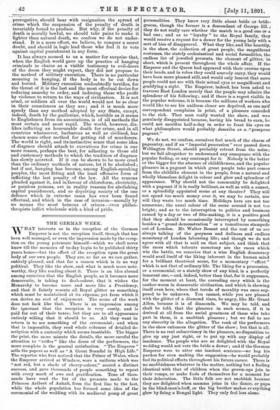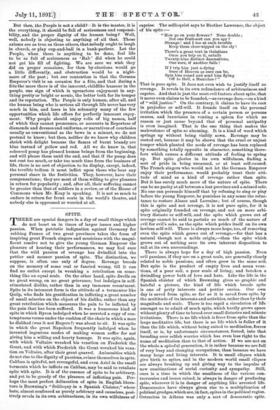THE GERMAN WEEK.
WHAT interests us in the reception of the German V V Emperor is not the reception itself, though that has
been well managed, or even the impression made by the recep- tion on the young potentate himself—which we shall never know till the memoirs of to-day begin to be published thirty years hence—but the effect of the reception upon the great body of our own people. They are, so far as we can gather, entirely pleased, and that for a reason which is in no way political. They like the show, and what is much more note- worthy, they like reading about it. There is an idea abroad among ourselves that the English people, as it becomes more democratic, is taking to drab-colour, that it wishes the Monarchy to become more and more like a Presidency, and that it faintly resents all Royal glitter as something which must be maintained at its expense, yet from which it can derive no sort of enjoyment. The scene of the week does not look like that. There is an impression among the ignorant that the reception is very costly, and is paid for out of their taxes ; but they are to all appearance entirely willing that it should be so. All they want in return is to see something of the ceremonial;- and when that is impossible, they read whole columns of detailed de- scription with a curiosity which seems insatiable. The bigger the print, the more minute the details, the more careful the attention to " trifles " like the dress of the performers, the more complete is the general satisfaction. "The Emperor" sells the papers as well as "A Great Scandal in High Life." The reporter who first noticed that the Prince of Wales, when the Emperor arrived at Windsor, wore a uniform which was "not red, but a shade of cherry-colour," scored a distinct success, and gave thousands of people something to repeat with every mark of awe and gratification. Tens of thou- sands have read the list of the presents made to the Princess Aribert of Anhalt, from the first line to the last, while the whole population has formed some idea of the ceremonial of the wedding with its medifeval pomp of great
personalities. They know very little about bride or bride- groom, though the former is a descendant of George Ill.; they do not really care whether the match is a good one or a bad one; and as to "loyalty" to the Royal family, they would receive a request for a dower for the young lady with a sort of hiss of disapproval. What they like, and like heartily, is the show, the collection of great people, the magnificent costumes, the stately ecclesiastical and social, formalities, the endless list of jewelled presents, the element of glitter, in short, which is present throughout the whole affair. If the Emperor and the Queen had appeared with their crowns upon their heads, and in robes they could scarcely carry, they would have been more pleased still, and would only lament that more people could not see with their actual eyes so magnificent and gratifying a sight. The Emperor, indeed, has been asked to traverse East London merely that the people may admire the splendour of his following ; and if there is a regret visible in the popular welcome, it is because the millions of workers who would like to see his uniform closer are deprived, as one naïf correspondent complains in print, of a pleasure conceded to the rich. That man really wanted the show, and was genuinely disappointed because, having his bread to earn, he could not sacrifice half-a-day in order to feast his eyes on what philosophers would probably. describe. as..a -'.pompous pageant."
We do not, we confess, ourselves feel much of the charm of pageantry, and if an "Imperial procession" ever passed down Wellington Street, should probably retreat from the noise; but we fail altogether to understand any annoyance with the popular feeling, or any contempt for it. Nobody is the better or the bigger for the absence of childlikeness, and the popular pleasure in a pageant in which great people take part comes from the childlike element in the people, from a natural and wholly blameless delight in colour and glow and splendour of appearance. Why should not the community be delighted with a pageant if it is really brilliant, as well as with a sunset, or a splendidly appointed scene at any theatre? They will not spend too ranch money over it, we may be certain, nor will they waste too much time. Holidays here are not too numerous; the usual colour of the scene around is not too bright; and as to the interruption to politics and business caused by a day or two of fate-making, it is a positive good that they should be occasionally interrupted by something besides a "grand demonstration" or a tumultuous stampede out of London. Mr. Walter Besant and the rest of us are always talking of the greyness and dullness and endless monotony of London labouring life; and though we do not agree with all that is said on that subject, and think that the races which tolerate monotony are the races which win the battle, we conceive that a wise English democracy would avail itself of the liking inherent in the human mind for a brilliant theatrical scene, for a momentary " effect" which is not that of ordinary life. The liking for a procession, or a ceremonial, or a stately show of any kind, is a perfectly innocent one,— and, indeed, better than that, for it suppresses, for the moment at least, the corroding envy which is the canker-worm in democratic civilisation, and which is showing itself even here, where that teredo of morality was once sup- posed to be unknown. You cannot, while you are pleased with the glitter of a diamond tiara, be angry, like Mr. Grant Allen, because it is of diamonds. We may be told, and shall be told, that the pleasure in such scenes, if it is derived at all from the social greatness of those who take part in them, is a snobbish pleasure ; but we fall to see any sincerity in the allegation. The rank of the performers in the show enhances the glitter of the show ; but that is all. There is no real subserviency in the pleasure, no disposition to give up any just right, or to pat up with any display of insolence. The people who are so delighted with the Royal wedding would not vote the bride a dower ; and if the German Emperor were to utter one insolent sentence—we beg his pardon for even making the suggestion—he would probably feel its political effects throughout his future career. There is no snobbishness whatever in the matter, nothing but a feeling identical with that of children when the grown-ups join in their romps, or make fools of themselves for a moment for their delectation. The little folk are not snobbish because they are delighted when mamma joins in the dance, or papa in the blind-man's-buff, or the big brother makes everything glow by firing a Bengal light. They only feel less alone. But then, the People is not a child?. It is the master, it is the everything, it should be full of seriousness and responsi- bility, and the proper dignity of the human being? Well, well, nobody is objecting to anything of all that. Those axioms are as true as these others, that nobody ought to laugh in church, or play cup-and-ball in a bank-parlour. Let the People, when, there is anything to be done, feel life to be as full of seriousness as 'Rah' did when he could not get his fill of fighting. We are sure we wish they did on proper occasions, for then by-elections would go a little differently, and obstruction would be a night- mare of the past ; but our contention is that the German Emperor's visit is an occasion for a fete, and that during a fete the more there is of the innocent, childlike humour in the people, one sign of which is uproarious enjoyment in any- thing pretty or bright or scenic, the better both for its temper and its reputation. The People is only human, after all, and the human being who is serious all through life never has very much in him, and loses in his solemnity many of the few opportunities which life offers for perfectly innocent enjoy- ment. Why people should enjoy rolls of big names, half of which they cannot pronounce, or accounts in Reportese of diamonds and dresses and uniforms, or narratives of courtesies usually as conventional as the bows in a minuet, we do not pretend to know; but then, neither do we know why children shriek with delight because the flames of burnt brandy are blue instead of yellow and red. All we do know is, that coloured pomp has pleased human beings from the beginning, and will please them until the end, and that if the pomp does not cost too much, or take too much time from the business of life, there is no sort of objection to its display, except, indeed, the terrible tedium it must inflict upon those who bear any personal share in the festivities. They, however, have their
compensations; they are most of them willing to give pleasure in return for popularity ; and, after all, their suffering cannot be greater than that of soldiers in a review, or of the House of Commons when Mr. Keay is speaking. It is not so much to endure in return for front seats in the world's theatre, and nobody else is oppressed or worried at all.



































 Previous page
Previous page